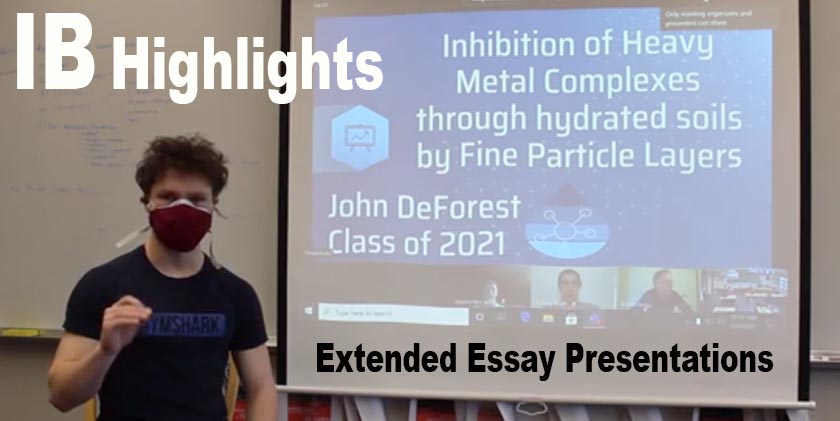
On Tuesday, February 2nd, 16 senior IB Diploma candidates talked about their IB Extended Essays to juniors who are starting to plan their own Extended Essays. It was an opportunity to ask questions about the process of researching and writing a 4,000-word paper and to celebrate what the seniors have accomplished. Each senior spoke for five minutes and then answered questions for another five minutes.
Watch videos of three of their presentations -- Chaitanya Nalluri (Social Studies) on the current political climate in India, John DeForest (Chemistry) on biochemical processes that could isolate heavy metals, and Gabi Cunningham (Spanish) on an indigenous Mexican character in modern literature.

An SGS senior has used the International Baccalaureate Diploma Programme to investigate the effects of the U.S.-China trade war on consumers in this country.
Extended Essay Highlight: Senior Clark Chen’s EE question was: "How did the U.S.-China trade war impact the consumer’s regular expenditure regarding apparel and footwear in the United States?" Clark wants to pursue Business classes in college and felt like this topic would help him understand the concepts better. He says, “The impact of a trade war between two biggest countries in the world do not only negatively or positively affect the two countries that engaged into the trade war. At the same time, it also impacts the smaller economies, like some firms and countries. In order to do the research, I choose to narrow it down to only basic products in the stores, excluding big products like houses, cars, etc."
CAS Experience Highlights: CAS experiences for all of our Upper School students (in the US and in China) include skiing for the first time, putting together and delivering donations to the MLK center in Spokane, baking a cake, chopping down trees, doing yoga, practicing meditation, practicing basketball, programming, cooking, making a custom sweatshirt, playing soccer, taking photos, creating an infectious disease flyer, participating in a horse clinic, demolition on a kitchen, wake surfing, participating in the winter rover float, running GLOW club, helping a neighbor cut a fallen tree, making cloud lights, creating a photo wall, writing for the literary magazine, creating a self-care menu, playing violin, kayaking, moving furniture, learning to cook, helping clean a church, making cake pops, tutoring mother in chess, making autumn pear paste, working in a cattery, drawing, making cookies, surfing in Sanya, testing environmental Covid samples, writing a MLK essay, snowboarding, and helping with the 2nd grade bubble project.
IB Question of the Week: How can we see what students around the world are doing in IB Art?
The IB says: “Our IB community is continuing to share artwork online via #IBart. You can now view their creative work via our IB network to celebrate and support them online... The IB has decided to launch a dedicated page using #IBart to further circulate all of the artwork being produced. By adding a location to your post on Twitter or Instagram, it will enable us to create a map of all the work taking place around the world, keeping our IB community well connected.
"We would like to make our students aware that using #IBart to showcase artwork will not impact or influence the grading of the artwork itself. Instead, it can be used to inspire and grow our IB community by raising awareness of creativity digitally and globally. If you would like to explore the artwork currently being circulated, please visit our dedicated exhibition page.”
IB Overview: The Diploma Programme (DP) curriculum for grades 11-12 is made up of six subject groups and the DP core, comprising Theory of Knowledge (TOK), Creativity, Activity, Service (CAS) and the Extended Essay (EE). Please refer to our IB webpage and to the IB Resources page in PowerSchool Learning for detailed IB information.
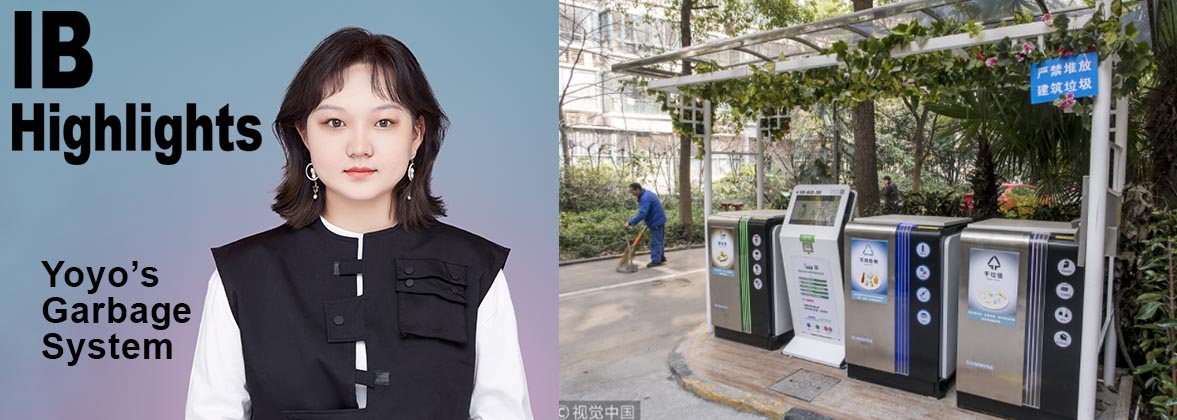
An SGS senior has used the International Baccalaureate Diploma Programme to develop a garbage classification system for her neighborhood in China.
CAS Project Highlight: Senior Yoyo Yang organized a garbage classification in her neighborhood community in China. She first called the property management company of her community to ask if they were willing to help her. They told her it was a great idea, and the Chinese government is actually encouraging communities to do garbage classification. She helped them obtain three garbage cans: one for kitchen garbage, one is for recycling, and one is for other garbage. To get everyone started, she had to monitor the cans and teach her neighbors about how to separate trash into the different cans. From this project, Yoyo learned about planning and working with others. She had been living in her neighborhood for a long time, but it was the first time that she got to know so many neighbors. Her learning outcomes included demonstrating how to initiate and plan a CAS experience, recognizing the benefits of working collaboratively, and engaging with issues of global significance.
CAS Experience Highlights: CAS experiences for all of our Upper School students (in the US and in China) include participating in Lifetime Sports, doing ESL tutoring, creating a paint by number, cooking dinner for friends and family, doing an Enemy of the People translation into Chinese (not a course project, just a personal project), skiing, embroidering, a winter river float, attending dance class, helping a friend with MS, teaching dance, doing yoga, helping a sibling with Math, sewing shoes, personalizing jackets, participating in the Community Service Club, participating in the Diversity Club, participating in the Glow Club, custom clothing, making churros, and participating in the Writing Center.
EE Highlight: Presentations
On Tuesday, February 2nd, the seniors will be presenting their Extended Essays during B Block (Core Class). We are asking the incoming junior EE students to be the audience for those presentations to both celebrate what the seniors have accomplished and to gain some insight into the EE process. Juniors, this is a great chance to learn from people who have just finished their EEs. As much as possible, we’d like you to be there in person to ask questions and support the seniors.
IB Overview: The Diploma Programme (DP) curriculum for grades 11-12 is made up of six subject groups and the DP core, comprising Theory of Knowledge (TOK), Creativity, Activity, Service (CAS) and the Extended Essay (EE). Please refer to our IB webpage and to the IB Resources page in PowerSchool Learning for detailed IB information.

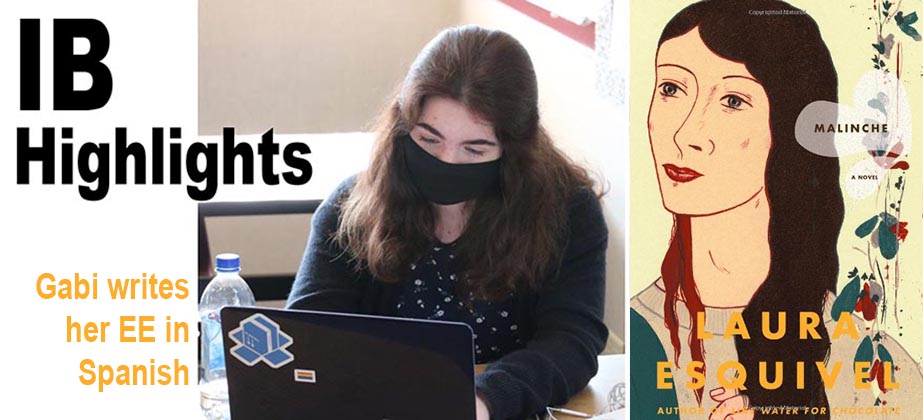

An SGS senior has used the International Baccalaureate Diploma Programme to set up a program to reduce stress in her neighborhood -- with therapy bunnies and tea!
CAS Project Highlight: Senior Erika Piotrowski has developed a Bunny Outreach Program that she will run for two months. This will be a neighborhood stress release program with her pet bunnies as therapy animals. She plans to individually schedule people for the program, then show up wearing a mask and bringing a folding table. She will set the rabbit and some tea on the table then move six feet back. The neighbor, who is wearing a mask, will help themselves to refreshments and will be able to interact with the bunny. In conjunction, they will discuss their day and any other light-hearted topics. Erika has already discussed this program with some neighbors to gauge interest, and they all seem really enthused by it.
CAS Experience Highlights: CAS experiences for all of our Upper School students (in the US and in China) include cooking clams, delivering cookies, making rings, shadowing a parent at work for a day, skiing, participating in a community night, making dessert, volunteering at 2nd Harvest, making a snowman, solving a Rubik’s cube, and walking dogs.
EE Highlight: Senior Sophie Yao is doing her Extended Essay on a topic in Economics. She is discovering the pros and the cons of her EE question: To What extent does passing out coupons to citizens influence the general merchandise industry in Hangzhou, China. She came up with the idea because Hangzhou’s government was passing out an electronic coupon through a site called Alipay. Most of the citizens had successfully obtained the coupon, including Sophie’s mother, which sparked her interest in her research topic.
IB Question of the Week: Can you explain a little more the difference between HL and SL courses?
With humor, see the picture below:

But seriously, follow this link to see the brief on HL and SL courses: https://www.ibo.org/globalassets/publications/recognition/slhl-brief-en.pdf
“It is essential for any pre-university education to equip students with the depth of discipline-specific knowledge and skills that they will need for their chosen academic and career paths. However, this must be balanced with the breadth needed to develop well-rounded students who can draw connections between the different disciplines.
"As such, the philosophy of the IB DP is that students should engage with a range of subjects while being able to explore specific areas of personal interest in greater depth. SL courses ensure students are exposed to a range of disciplines that they might otherwise opt out of, and HL courses allow students to spend more time with subjects they are more interested in by exploring options in addition to the SL core curriculum. In this sense, all DP courses, regardless of whether they are SL or HL, are integral to the programme.”
IB Overview: The Diploma Programme (DP) curriculum for grades 11-12 is made up of six subject groups and the DP core, comprising Theory of Knowledge (TOK), Creativity, Activity, Service (CAS) and the Extended Essay (EE). Please refer to our IB webpage and to the IB Resources page in PowerSchool Learning for detailed IB information.
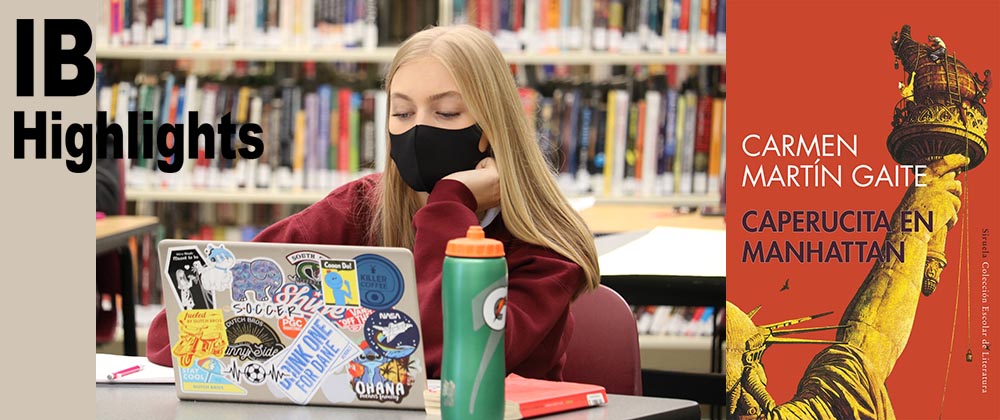
An SGS senior has used the International Baccalaureate Diploma Programme to explore the meaning of characters created by a major Spanish author.
EE Highlight: Senior Cambrie Rickard is writing her Extended Essay on the book Caperucita en Manhattan (Little Red Riding Hood in Manhattan) by Carmen Martín Gaite, one of the most important and influential Spanish authors of the 20th Century. Cambrie is writing about the representations of freedom (libertad) and solitude (soledad) in the novel as portrayed by some of the characters, especially Miss Lunatic.
CAS Project Highlight: Reagan Ivey and Adelaide Lennemann will be starting a clothing drive to donate clothes to the Teen and Kid Closet. They will promote the drive with posters and other means and will deliver the donations to the closet. The drive will run for 2-3 weeks. Details will be coming out soon.
CAS Experience Highlights: CAS experiences for all of our Upper School students (in the US and in China) include the lifetime fitness class, learning to sew, skiing on Mt. Spokane, learning about human trafficking and making care packages w/ Spokane Girl Up Club, OUR, and International Network of Hearts, restarting the writing center, skiing, setting up Christmas lights, building a snowman, playing ping pong, doing Among Us drawings, painting a picture, and creating a game server.
IB Question of the Week: What is the IB doing about exams during the pandemic?
The IB continues to release updated guidance for schools regarding assessment since the pandemic started. Their documents aim to supplement the subject guides and existing teacher support material (TSM) for DP subjects and to share guidance and advice on how teachers can support students working remotely to undertake this work.
Last year, the IB established a non-exam route as a result of the pandemic and came up with a course grade for students using their Internal Assessments (IAs), predicted grades from teachers, and past predicted grade reliability.
Schools who tested in November 2020 were given the guidance that they could opt in or out of exams. If they opted into exams, a student’s course grades would be based on their exams, IAs, predicted scores and past predicted grade reliability. If schools opted out, course grades would be based on IAs, predicted grades and past predicted grade reliability, like in May 2020.
The IB has not yet sent official and final guidance for the May 2021 cohort. They have told schools to look at the guidance given to November 2020 schools for what to expect. Schools have been told by the IB to expect an official guidance to be released in late January/early February. So far, for the May 2021 cohort, it is official that all IAs will be sent to the IB examiners, and not just a sampling as in a normal year. We are waiting to hear about the exam and non-exam choices and routes.
IB Overview: The Diploma Programme (DP) curriculum for grades 11-12 is made up of six subject groups and the DP core, comprising Theory of Knowledge (TOK), Creativity, Activity, Service (CAS) and the Extended Essay (EE). Please refer to our IB webpage and to the IB Resources page in PowerSchool Learning for detailed IB information.
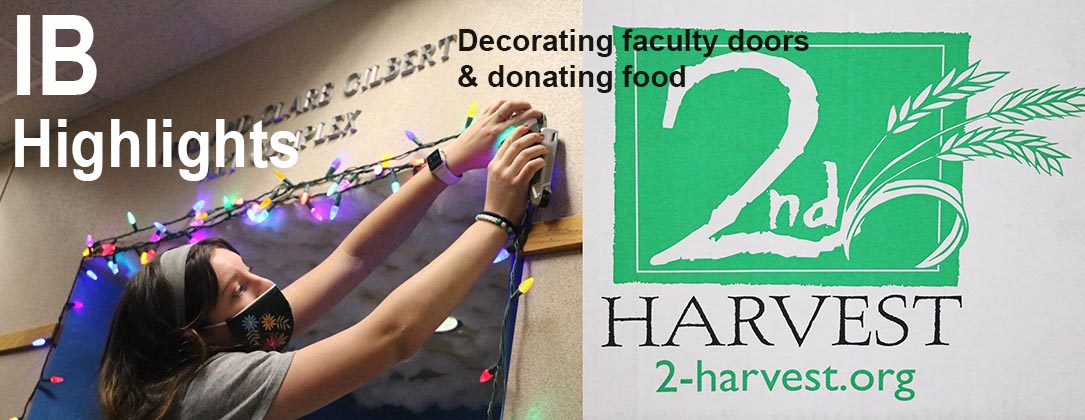
One aspect of the International Baccalaureate Diploma Programme is CAS (Creativity, Activity, Service). SGS Upper School students (in the US and in China) performed a wide variety of CAS experiences during the holiday break.
CAS Experience Highlights: Delivering cards and gifts to nurses, cleaning up their neighborhood, making a Cindy Lou, participating in Operation Christmas Smile, dog walking, learning breakdancing for fun, participating in the US door decorating, teaching themselves to play Stairway to Heaven, playing tennis, skiing at Silver Mountain, a week of exercising a dog, debate tournament, participating in the 2nd Harvest Food drive, making Christmas cookies for friends, picking chrysanthemums, visiting a Panda base, mentoring, making a grocery basket to donate, learning a new gymnastic drop using silks, wrapping gifts, decorating advisory doors, going to a barbershop and learning about a new culture.
IB Question of the Week: Are there any YouTube videos that help students/parents further understand the IB and also that help students navigate IB courses?
Yes, often times IB alumni will post YouTube videos, either explaining the IB or helping students with certain tactics they learned when taking certain courses and studying for exams. All ages can benefit from watching these videos because KNOWLEDGE IS POWER! Here are some relevant videos:
> Ivy Lilia’s video on “IB EXPLAINED | everything you NEED TO KNOW about IB” can be found here: https://youtu.be/6mRI6Mcp5hM. Ivy has lots of IB videos out there so check out her channel.
> One student who got a 45 (the highest score you can get) explains her top ten tips here: https://youtu.be/dk4y0jWdKgI
> Diana Ang gives her tips from “a realistic IB student” here: https://youtu.be/jq7ZGRbOxzw
IB Overview: The Diploma Programme (DP) curriculum for grades 11-12 is made up of six subject groups and the DP core, comprising Theory of Knowledge (TOK), Creativity, Activity, Service (CAS) and the Extended Essay (EE). Please refer to our IB webpage and to the IB Resources page in PowerSchool Learning for detailed IB information.
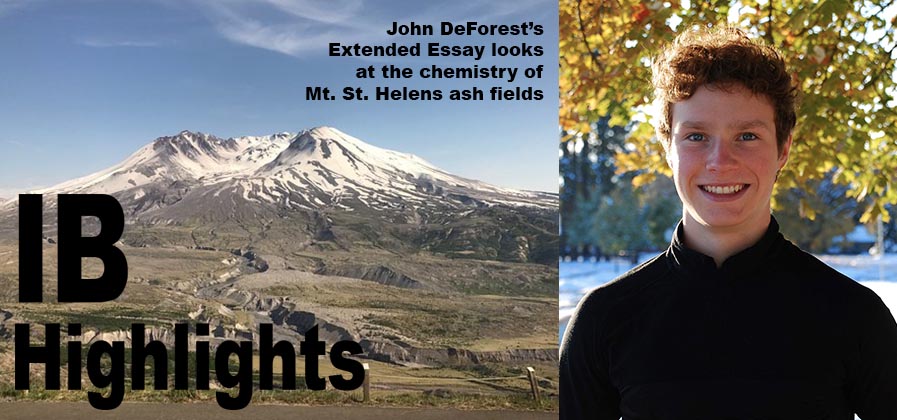
An SGS senior has used the International Baccalaureate Diploma Programme to explore a topic of particular interest to him -- heavy metal contamination.
EE highlight: Senior John DeForest chose to write his extended essay on a topic in Chemistry, a subject he is passionate about. His EE question is: How is the rate of diffusion of iron through hydrated sediments affected by the presence and properties of solid layers? His advisor, SGS chemistry/biology teacher Ian Townley, and partners at Kaiser Aluminum are helping him. What inspired John to pick this topic? “I read an article in a local online newspaper about heavy metal contamination in nearby Lake Coeur d' Alene -- scientists were concerned about rising fertilizer runoff into the lake and surrounding tributaries causing heavy metals from decades of mine tailings to release from their resting place in the sediment. Nowhere in the article did it mention just how fertilizer was causing the heavy metals to leach out, and I was intrigued by this. Thus began a long process of digging through the literature, calling local tribes and researchers, and connecting with local manufacturing companies to find answers."
"I discovered that it was more of a biological process than a chemical one," John says. "Bacteria eat the iron that stores the heavy metals, releasing them into the sediment and water column. I reassessed with my advisor and decided that the release process was too complex in both scope and equipment, so I turned to a different factor that affects heavy metal release. Layers of ash from the Mt. St. Helens eruption appear to have blocked the movement of heavy metals complexed in the iron (which would prevent them moving to areas with bacteria). So I am designing an experiment to discern the chemical and physical properties of sediment layers that block this process.”
Once again, we love to see how the process of choosing a topic comes to be and evolves with research. We cannot wait to read this full EE in January.
CAS Project Highlight: Five graduates from the DP program, in places spread all over the world, reflect on the values and benefits of CAS in this article: https://blogs.ibo.org/blog/2019/11/01/cas-service-benefits/
CAS Experiences Highlights: CAS experiences for all of our Upper School students (in the US and in China) this week included participating in the mentor program, making videos for Lower School students, raking leaves for the Ronald McDonald House, making cards for the police and sheriffs, cleaning up a yard for a cancer patient, creating flyers, skiing, adopted family Christmas shopping, taking a CPR, BLS and First Aid class, curating a cheese board, tutoring,
IB Question of the Week: Why is it important to choose an extended essay topic that a student is passionate about?
DP graduate Stephanie Stan, from Bloomfield Hills High School, offers her advice on how to make the extended essay transform from just an assignment to a project that expands upon your own knowledge of a topic. See her article here: https://blogs.ibo.org/blog/2018/05/02/extended-essay-topic/
IB Overview: The Diploma Programme (DP) curriculum for grades 11-12 is made up of six subject groups and the DP core, comprising Theory of Knowledge (TOK), Creativity, Activity, Service (CAS) and the Extended Essay (EE). Please refer to our IB webpage and to the IB Resources page in PowerSchool Learning for detailed IB information.
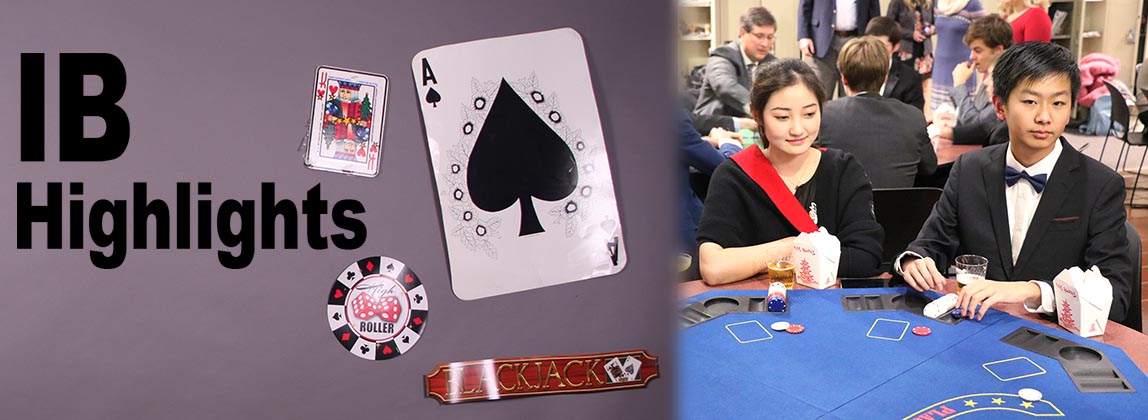
Latest News | Page 2 | Page 3 | Page 4 | Page 5 | Page 6